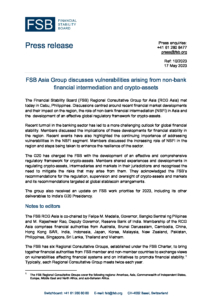Press enquiries:
+41 61 280 8477
[email protected]
Ref: 39/2023
The Financial Stability Board (FSB) Regional Consultative Group for Asia (RCG Asia) met today in Hong Kong. Discussions centred around recent financial market developments and their impact on the region, vulnerabilities arising from non-bank financial intermediation (NBFI), the deepening of the sovereign-bank nexus in some emerging market and developing economies (EMDEs), and ways to promote effective regulation and supervision of crypto-asset related risks. Members also received an update on the FSB’s work programme for 2024 and exchanged views on potential topics of focus for RCG Asia in the coming year.
The global financial system is adjusting to a higher interest rate environment. More fundamentally, the current tightening is occurring in a global financial system where the provision of finance through non-banks is comparable in size to bank credit. In addition, some EMDEs face a challenge from the combination of high government debt and large bank holdings of domestic government bonds.
The group discussed the impact of tightening global financial conditions in the region and issues arising from the development of the sovereign-bank nexus. The group also discussed vulnerabilities arising from NBFI. Members shared their experiences of identifying, monitoring, and addressing these risks and welcomed the FSB’s continued focus on enhancing resilience in the sector.
Since the previous meeting in May, the FSB has finalised a global regulatory framework for crypto-asset activities and set out a roadmap, developed together with relevant international organisations and standard-setting bodies, to ensure the effective implementation of the FSB’s and IMF’s recommendations. The group discussed progress in implementing regulatory frameworks for crypto-asset activities in their jurisdictions and ways to ensure effective and coordinated implementation of the comprehensive policy response for crypto-assets. This included, among others, enhanced capacity building, data sharing and more frequent dialogue among members.
Notes to editors
The FSB RCG Asia is co-chaired by Eddie Yue, Chief Executive, Hong Kong Monetary Authority and P Nandalal Weerasinghe, Governor, Central Bank of Sri Lanka. Membership of the RCG Asia comprises financial authorities from Australia, Brunei Darussalam, Cambodia, China, Hong Kong SAR, India, Indonesia, Japan, Korea, Malaysia, New Zealand, Pakistan, Philippines, Singapore, Sri Lanka, Thailand and Vietnam.
The FSB has six Regional Consultative Groups, established under the FSB Charter, to bring together financial authorities from FSB member and non-member countries to exchange views on vulnerabilities affecting financial systems and on initiatives to promote financial stability.1 Typically, each Regional Consultative Group meets twice each year.
The FSB coordinates at the international level the work of national financial authorities and international standard-setting bodies and develops and promotes the implementation of effective regulatory, supervisory, and other financial sector policies in the interest of financial stability. It brings together national authorities responsible for financial stability in 24 countries and jurisdictions, international financial institutions, sector-specific international groupings of regulators and supervisors, and committees of central bank experts. The FSB also conducts outreach with approximately 70 other jurisdictions through its six Regional Consultative Groups.
The FSB is chaired by Klaas Knot, President of De Nederlandsche Bank. The FSB Secretariat is located in Basel, Switzerland and hosted by the Bank for International Settlements.
- The FSB Regional Consultative Groups cover the following regions: Americas, Asia, Commonwealth of Independent States, Europe, Middle East and North Africa, and sub-Saharan Africa. [←]
